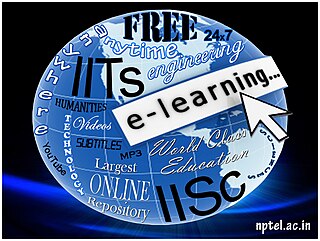The National Institutes of Technology (NITs) are centrally funded technical institutes under the ownership of the Ministry of Education, Government of India. They are governed by the National Institutes of Technology, Science Education, and Research Act, 2007, which declared them institutions of national importance and laid down their powers, duties, and framework for governance. The act lists 31 NITs. Each NIT is autonomous and linked to the others through a common council known as the Council of NITSER, which oversees their administration. All NITs are funded by the Government of India.

University Grants Commission is a statutory body under Department of Higher Education, Ministry of Education, Government of India. It was set up in accordance to the UGC Act 1956 and is charged with coordination, determination and maintenance of standards of higher education in India. It provides recognition to universities in India, and disbursements of funds to such recognized universities and colleges. The UGC headquarters are in New Delhi, and it has six regional centres in Pune, Bhopal, Kolkata, Hyderabad, Guwahati and Bangalore. A proposal to replace it with another new regulatory body called HECI is under consideration by the Government of India. The UGC provides doctoral scholarships to all those who clear JRF in the National Eligibility Test. On an average, each year ₹725 crore (US$87 million) is spent on doctoral and post-doctoral fellowships by the commission.
DD Free Dish is an Indian free-to-air satellite television provider owned and operated by Public Service Broadcaster Prasar Bharati. It was launched in December, 2004. In March 2022, It has a reach of over 43 million households which is more than 25% of the total TV households in the country. DD Free Dish earns by selling slots to private broadcasters through e-auction.

National Institute of Technology Durgapur, formerly known as Regional Engineering College, Durgapur, is a public technical university in the city of Durgapur in West Bengal, India. Founded in 1960, it is one of India's oldest technical universities. It is located on a campus of 187 acres (0.75 km²).

The All India Council for Technical Education (AICTE) is a statutory body, and a national-level council for technical education, under the Department of Higher Education. Established in November 1945 first as an advisory body, which was given statutory status by an Act of Parliament in 1987, the AICTE is responsible for proper planning and coordinated development of the technical education and management education system in India.

Lords Institute of Engineering and Technology (LIET) is a self-financing Muslim Minority Autonomous Engineering College near Appa Junction, Himayath Sagar, Ranga Reddy district, Telangana, India, 11 km from Mehdipatnam.
The Distance Education Bureau (DEB) is a bureau of the UGC based in New Delhi, India, in charge of regulating distance education in India. It was established in 2012, replacing the DEAC, an organisation that was responsible for open learning and distance education since 1985.

Sant Longowal Institute of Engineering and Technology is a Govt. of India established (1989) deemed university under Section 3 of the UGC Act 1956 for higher education and research in India. The UG Program of SLIET is accredited as TIER 1 by the NBA. It is well known as the "Modern Gurukul" of Tech Education due to lush green campus of 451 acres (183 ha) in Longowal, Sangrur, Punjab, India. SLIET is fully funded by the Ministry of Human Resource Development, and is an autonomous body controlled by the SLIET Society. Institute has been set up in the memory of Late Sh. Harchand Singh ji Longowal under Rajiv Longowal Punjab accord. Educational opportunities include technical and practical training in the fields of engineering and technology. The students and alumni of SLIET are informally referred to as SLIETians.

Indira Gandhi National Open University, known as IGNOU, is a public distance learning university located in New Delhi, India. Named after the former Prime Minister of India Indira Gandhi, the university was established in 1985 with a budget of ₹20 million, after the Parliament of India passed the Indira Gandhi National Open University Act, 1985. IGNOU is run by the central government of India, and with a total active enrollment of over 4 million students, it is the largest university in the world.
OpenCourseWare (OCW) are course lessons created at universities and published for free via the Internet. OCW projects first appeared in the late 1990s, and after gaining traction in Europe and then the United States have become a worldwide means of delivering educational content.

The Ministry of Education (MoE) is a ministry of the Government of India, responsible for the implementation of the National Policy on Education. The ministry is further divided into two departments: the Department of School Education and Literacy, which deals with primary, secondary and higher secondary education, adult education and literacy, and the Department of Higher Education, which deals with university level education, technical education, scholarships, etc.

Higher education system in India includes both public and private universities. Public universities are supported by the union government and the state governments, while private universities are mostly supported by various bodies and societies. Universities in India are recognized by the University Grants Commission (UGC), which draws its power from the University Grants Commission Act, 1956. The main governing body is the University Grants Commission, which enforces its standards, advises the government, and helps coordinate between the center and the state. Accreditation for higher learning is overseen by various autonomous institutions established by the University Grants Commission (UGC).
Sir Padampat Singhania University (SPSU) is a private, residential university located in Udaipur, India. The university was established by the J K Cement group of companies, and is named after the founder of the J K Organisation, Sir Padampat Singhania.

India has the largest numbers of engineers as well as the largest number of engineering education institutes and infrastructure in the world. As of 2021, India annually produces 1.5 million engineering graduates. India's technical education infrastructure includes 2500 engineering colleges, 1400 polytechnics and 200 schools of planning and architecture.

Dr.L.H.Hiranandani College of Pharmacy (DLHHCOP) is a Pharmacy College in the Mumbai suburban (Ulhasnagar) and affiliation to the University of Mumbai. The College is under Sindhi Minority.

National Institutional Ranking Framework (NIRF) is a ranking methodology released annually by the Ministry of Education, Government of India, to rank institutions of higher education in India. The framework was approved by the former Ministry of Human Resource Development and launched by the Minister on 29 September 2015.

The National Programme on Technology Enhanced Learning (NPTEL) is an Indian e-learning platform for university-level science, technology, engineering, and mathematics (STEM) subjects. NPTEL is the largest e-repository in the world of courses in engineering, basic sciences and selected humanities and management subjects. The platform and materials have been jointly developed by Indian Institutes of Technology (IITs) and Indian Institute of Science. The initiative is funded by the central Ministry of Education. The project's central idea is to put recorded lectures taught by its member institutes online for open access. It operates an educational YouTube channel covering engineering, basic sciences, and some humanities and social science subjects. Popular NPTEL courses are being translated into popular local languages. The local languages which the translation are available in include Assamese, Bengali, Gujarati, Hindi, Kannada, Malayalam, Marathi, Odia, Punjabi, Tamil and Telugu.

National Institute of Technical Teachers' Training and Research, Chennai (NITTTR) is a deemed to be university under distinct category under the Ministry of Education, Government of India. NITTTR Chennai is located in Tharamani in Chennai.
Institutes of Eminence (IoE) is a recognition status for higher education institutes in India, which was set up in 2017 by the University Grants Commission. Recognised institutions are granted more autonomy, both administratively and academically, are allowed to open offshore campuses, and enjoy better collaboration opportunities with global universities. The plan encompasses twenty institutions, twelve of which have already been declared Institutes of Eminence as of April 2021. Public institutions are granted up to ₹1,000 crore ; no funding is awarded to private institutions. This scheme is equivalent to Russel Group Universities in the UK.













